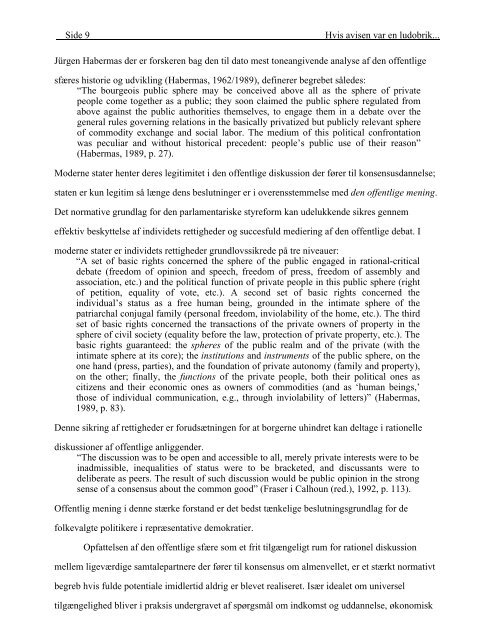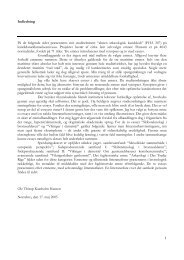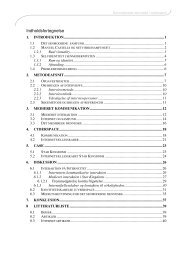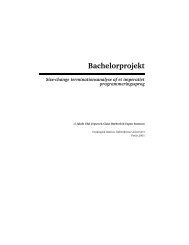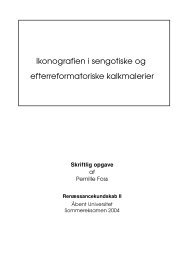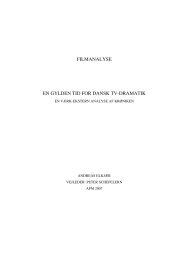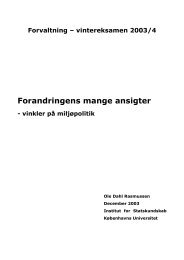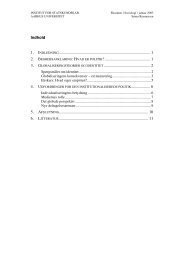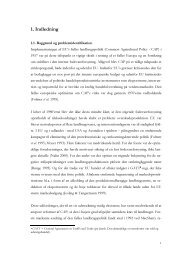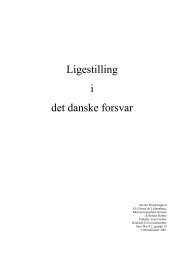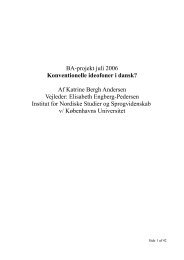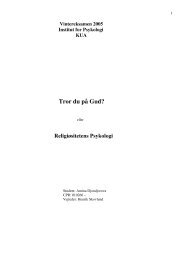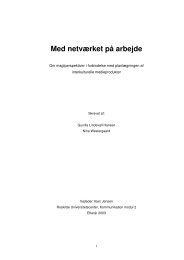Hvis avisen var en ludobrik... ...var den så slået hjem nu?
Hvis avisen var en ludobrik... ...var den så slået hjem nu?
Hvis avisen var en ludobrik... ...var den så slået hjem nu?
You also want an ePaper? Increase the reach of your titles
YUMPU automatically turns print PDFs into web optimized ePapers that Google loves.
Side 9 <strong>Hvis</strong> <strong>avis<strong>en</strong></strong> <strong>var</strong> <strong>en</strong> <strong>ludobrik</strong>...<br />
Jürg<strong>en</strong> Habermas der er forsker<strong>en</strong> bag d<strong>en</strong> til dato mest toneangiv<strong>en</strong>de analyse af d<strong>en</strong> off<strong>en</strong>tlige<br />
sfæres historie og udvikling (Habermas, 1962/1989), definerer begrebet <strong>så</strong>ledes:<br />
“The bourgeois public sphere may be conceived above all as the sphere of private<br />
people come together as a public; they soon claimed the public sphere regulated from<br />
above against the public authorities themselves, to <strong>en</strong>gage them in a debate over the<br />
g<strong>en</strong>eral rules governing relations in the basically privatized but publicly relevant sphere<br />
of commodity exchange and social labor. The medium of this political confrontation<br />
was peculiar and without historical preced<strong>en</strong>t: people’s public use of their reason”<br />
(Habermas, 1989, p. 27).<br />
Moderne stater h<strong>en</strong>ter deres legitimitet i d<strong>en</strong> off<strong>en</strong>tlige diskussion der fører til kons<strong>en</strong>susdannelse;<br />
stat<strong>en</strong> er kun legitim <strong>så</strong> længe d<strong>en</strong>s beslutninger er i over<strong>en</strong>sstemmelse med d<strong>en</strong> off<strong>en</strong>tlige m<strong>en</strong>ing.<br />
Det normative grundlag for d<strong>en</strong> parlam<strong>en</strong>tariske styreform kan udelukk<strong>en</strong>de sikres g<strong>en</strong>nem<br />
effektiv beskyttelse af individets rettigheder og succesfuld mediering af d<strong>en</strong> off<strong>en</strong>tlige debat. I<br />
moderne stater er individets rettigheder grundlovssikrede på tre niveauer:<br />
“A set of basic rights concerned the sphere of the public <strong>en</strong>gaged in rational-critical<br />
debate (freedom of opinion and speech, freedom of press, freedom of assembly and<br />
association, etc.) and the political function of private people in this public sphere (right<br />
of petition, equality of vote, etc.). A second set of basic rights concerned the<br />
individual’s status as a free human being, grounded in the intimate sphere of the<br />
patriarchal conjugal family (personal freedom, inviolability of the home, etc.). The third<br />
set of basic rights concerned the transactions of the private owners of property in the<br />
sphere of civil society (equality before the law, protection of private property, etc.). The<br />
basic rights guaranteed: the spheres of the public realm and of the private (with the<br />
intimate sphere at its core); the institutions and instrum<strong>en</strong>ts of the public sphere, on the<br />
one hand (press, parties), and the foundation of private autonomy (family and property),<br />
on the other; finally, the functions of the private people, both their political ones as<br />
citiz<strong>en</strong>s and their economic ones as owners of commodities (and as ‘human beings,’<br />
those of individual communication, e.g., through inviolability of letters)” (Habermas,<br />
1989, p. 83).<br />
D<strong>en</strong>ne sikring af rettigheder er forudsætning<strong>en</strong> for at borgerne uhindret kan deltage i rationelle<br />
diskussioner af off<strong>en</strong>tlige anligg<strong>en</strong>der.<br />
“The discussion was to be op<strong>en</strong> and accessible to all, merely private interests were to be<br />
inadmissible, inequalities of status were to be bracketed, and discussants were to<br />
deliberate as peers. The result of such discussion would be public opinion in the strong<br />
s<strong>en</strong>se of a cons<strong>en</strong>sus about the common good” (Fraser i Calhoun (red.), 1992, p. 113).<br />
Off<strong>en</strong>tlig m<strong>en</strong>ing i d<strong>en</strong>ne stærke forstand er det bedst tænkelige beslutningsgrundlag for de<br />
folkevalgte politikere i repræs<strong>en</strong>tative demokratier.<br />
Opfattels<strong>en</strong> af d<strong>en</strong> off<strong>en</strong>tlige sfære som et frit tilgængeligt rum for rationel diskussion<br />
mellem ligeværdige samtalepartnere der fører til kons<strong>en</strong>sus om alm<strong>en</strong>vellet, er et stærkt normativt<br />
begreb hvis fulde pot<strong>en</strong>tiale imidlertid aldrig er blevet realiseret. Især idealet om universel<br />
tilgængelighed bliver i praksis undergravet af spørgsmål om indkomst og uddannelse, økonomisk


